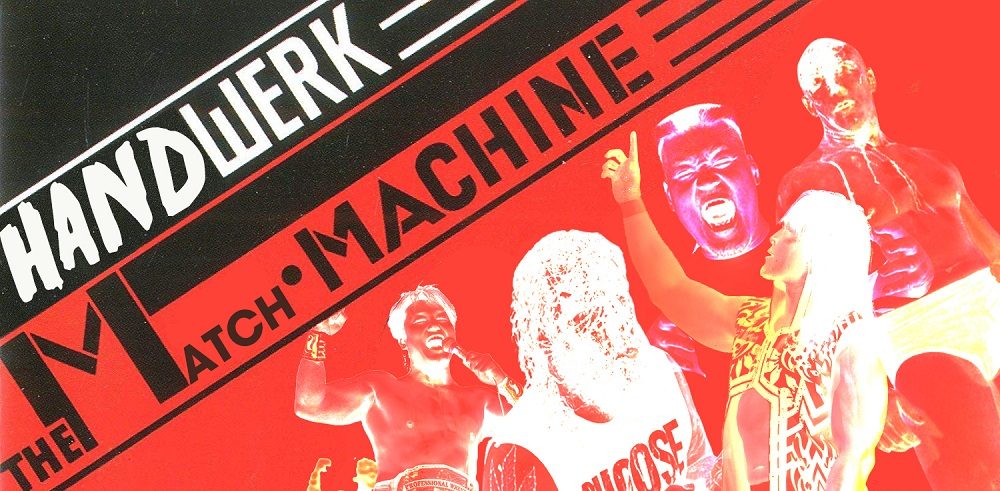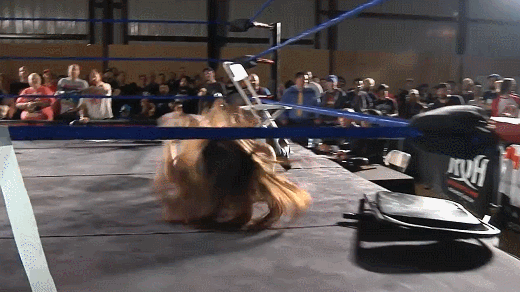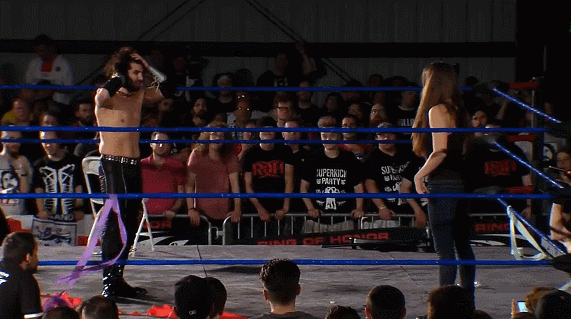This was for Amigo Tag’s Open the Twin Gate Titles.
Even relative to the few years before it, Dragon Gate footage from 2015 is incredibly hard to come by. As someone who sort of faded out of watching it (again) during the long BxB Hulk title reign that began in 2014, and didn’t totally come back until 2016, I hate it. I hate it more than the other absences because I at least know what’s missing and how I felt about it at the time. There’s none of that in 2015. It’s this thing I didn’t experience and can’t find anywhere, either legally (outside of the three or four shows from 2015 on DG’s official service) or otherwise (step it up IVP and streaming pirates), save for a few things that have remained online, either due to the star power of the names (Shingo vs. CIMA) or an exceedingly high reputation (Shingo vs. Mochi).
This is one of those matches from 2015 that has remained pretty widely available, and with really good reason.
It’s the best Twin Gate match ever.
Granted, that’s not an exceptionally high bar to clear. Twin Gate matches can get weighed down pretty easily by the same things that weigh down Dream Gate matches a lot of the times. Outside of this, the best of them are virtually all these great little dudes rock style slugfests, usually with Shingo, YAMATO, T-Hawk, Mochi, etc. involved. There are a handful of those matches that I really love all the same, but it’s not the same as calling it the best match in company history, or the bar it would have to clear if I called something the best IWGP Heavyweight Title or the best AJPW Unified World Tag Team Title match ever.
All the same, it is comfortably the best Twin Gate match ever.
It achieves that status largely through a combination of miracles, existing as God’s own Twin Gate match.
Firstly, it’s a both a big and a great Dragon Gate match in which very little context is needed.
The big story here is that Shachihoko BOY is the big underdog. It might help you to know his history. His years of working undercard tags, his failure to ever break through, even his place as the clear obvious and only weak link in Monster Express. Really though, you don’t need to know anything, because a big strength of this match is how clear they make everything from beginning to end. Shachi is undersized compared to everyone else, doesn’t get as much offense, and lacks both the aggression of his opponents and the confidence of his partner. He also comes in with tape on his lower back, marking him as injured in a way that nobody else in the match is. It’s clear very quickly into the match where everybody stands. Knowing the moves helps, but it only helps so much. The match is already great, and then a little context gives it a little push. It’s the kind of match someone can drop in on ten or twenty years later with a few sentences explaining things, and still totally get.
People very deeply into Dragon Gate on a level I can never truly understand (the real psychos) will praise the storytelling of this match as some great victory, like it wasn’t the easiest and best story to tell no matter what. Like most praise for deep Dragon Gate storytelling though, it’s kind of a load of shit. More often than not, that always just feels like a cover. There are a few long running stories that enhance certain matches and occasionally a big deal in one of the multi-mans with high stakes, but it’s not as hard of a promotion to parachute into as you might think. Things are generally pretty self evident, they’re all pretty expressive wrestlers, it’s not like how you need to start at 6/5/89 to totally appreciate 6/3/94. Context matters, only a fool would argue otherwise, but this really isn’t all that deep.
The real great matches don’t require supplemental homework to get them, and this is a really great match.
This is also a miracle because it’s a double limbwork match in Dragon Gate in which both sides of that are respected for the rest of the match and not just immediately blown off when the segment is over. Even more than that, it’s a genuinely respectful arm selling performance from SUSUMU YOKOSUKA of all people, one of the biggest offenders in Dragon System history of having matches in which none of that shit ever ever ever matters. I can count on one hand the other Susumu matches I’ve seen in which he paid this much attention to selling his arm throughout the entire matches, and I’d probably have a finger or two left over. Sometimes, we hyperbolize and stretch the meaning of words, but no, this is a genuine miracle. An act of God, with his hand on the bad shoulder of Yokosuka, if only to remind him of that fact.
Masato Yoshino has to be the one to go out and get that advantage. Shachihoko BOY simply can’t do it on his own. He can’t get much of anything on his own, and before too long, Kagetora bails out his partner before too much damage can be done. This is a particularly good way to go about it, as it means Susumu doesn’t really have to go wild with the selling, and it’s his choice to give a shit anyways even in little small ways twenty minutes later that does so much for the match. It’s also immediately a great contrast to the imbalance of the championship team. Kagetora clearly isn’t the star that Susumu is, but Susumu can trust him to go out and do it on his own. The work on Shachi’s back is genuinely mean as hell, and another aspect of this that absolves the match of needing much in the way of previous knowledge. It’s mean and dismissive and really brutal, it’s one of the better focused segments in recent Dragon Gate history. Shachi himself isn’t an incredible seller, he’s not even as good as Susumu is, but he’s functional and always seems very hurt, and it’s exactly enough. The onus is really more on Yokosuka in that department, and he does the best work of his career on that level. Shachi’s job is just to not let the match down, and he more than comes through.
Naturally, the finishing run is wild and awesome and hyperdramatic.
Yoshino’s hot tag is one of his best ever. There’s an urgency to it that stands out. Yoshino is always unbelievably fast in a way that you can only imagine someone becoming through a Faustian bargain, but he rarely feels desperate and frantic like he does here, having to do a lot of this on his own. Susumu’s arm selling continuing through this last third is where it becomes really impressive, and the Kagetora vs. Shachi nearfall runs are tremendous, but this is primarily Yoshino’s part of the match, and he kills it. Beyond all the big drama, most impressive of all from Our Hero is that in a match full of great Susumu Yokosuka lariats, Masato Yoshino is the one who delivers the single best and most fist pumpingly emphatic lariat of the match.
It comes down to Yokosuka and Shachcihoko BOY, and surprisingly, the two lesser wrestlers in the match absolutely kill it. Susumu strikes a rare perfect balance between selling the arm and still just hammering Shachi with the lariats, especially the Jumbo no Kaichis at the very end. Shachihoko BOY again doesn’t have to do a ton besides bump and die and look incredibly sympathetic, but he does it. Korakuen is with him. The world is with him. The kickouts, one of the regular Jumbo and the second of the leg trap followthrough cover, feel genuinely shocking and significant in a way that most nearfalls simply don’t.
It’s a role player or just a non-superstar having the game of his life in the most important game he can possibly play. It doesn’t always make a lot of sense and nobody can ever predict it, but sometimes this stuff can just break loose out of the universe into real life, and nobody ever wants it to end. It’s the stuff of legend. Steve Kerr snuffing out the Utah Jazz at the buzzer in ’97 and playing his part in denying a pedophile a ring.
Big Shot Shachihoko.
Fate of the universe on the line, Martians have the death beam, I want Shachihoko BOY.
All of that.
The match delivers one last miracle at the end, beyond just Shachihoko BOY surviving so much. Instead of the typical Dragon Gate thing of giving him his own big nearfall run and having some big dramatic piece of impact offense to have His Moment, they instead opt for something more surprising and more fitting with the story. Susumu just tries another, but Shachi twists around into a takedown, before diving into a cradle to just barely win.
Fittingly, a match full of small miracles ends with a finish and a result that feels like a gigantic one.
One of the best matches of the year, and in recent company history. A lot of the times, great matches can get lost, but a match like this has survived for a reason. If a mystical force in the universe ever smiled upon a Dragon Gate match, it did so in this match (and also for every Florida Brothers match).



